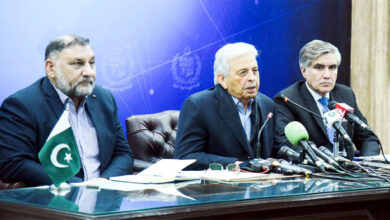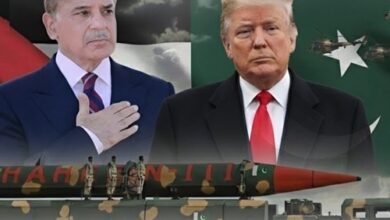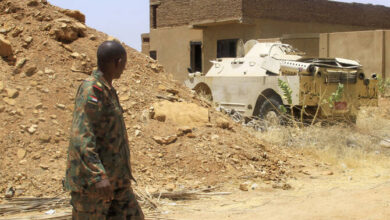سلايدر
?Who benefited from Sri Lankan tragedy
Adeela Naureen
A devastating series of eight bomb blasts ripped through churches holding Easter services and high-end hotels in Sri Lanka on 21 Apr 19, killing nearly 300 people, including dozens of foreigners and injuring nearly 500. International media especially that of India are in the forefront in reporting that a local Islamist extremist group called the National Tawheed Jamaath (NTJ) was behind the deadly suicide bomb attacks although no one has claimed responsibility.
Sri Lanka Tawheed Jamaath (SLTJ) is an associated arm of Indian Tamil Nadu Tawheed Jamaath (TNTJ). Other branches are in Middle East, US, UK, France and Australia. TNTJ is a non-political Islamic organization which was founded in 2004. TNTJ claims to preach Islam and is involved in social activities and encourages followers to observe peaceful protests. It held demonstrations and protests across Tamil Nadu several times on various issues including reconstruction of Babri Masjid, removal of liquor shops and load shedding. Hence, the organization and its subsidiaries do not have a pronounced history of terror activities.
Indian RAW’s involvement to destabilize neighbourhood of India is nothing new as it is part of a larger Indira Doctrine. One of the clauses of Indira Doctrine stated, “India will not tolerate external intervention in a conflict situation in any South Asian country, if the intervention has any implicit or explicit anti-Indian implication. No South Asian government must, therefore, ask for external military assistance with an anti-Indian bias from any country”. The timing of promulgation of Indira Doctrine in early eighties coincided with the implosion of civil war within Sri Lanka which converted this beautiful tourist paradise into a hell hole for next three decades.
As of 2011 census, 70.2 % of Sri Lankans are Theravada Buddhists, 12.6% are Tamil Hindus, 9.7% are Muslims (mainly Sunni) and 7.4% Christians. Buddhism is the state religion of Sri Lanka. However, the country provides freedom of religion and right to equality amongst all its citizens. There is negligible religious dissention in Sri Lanka – unlike India.
According to a recent McKinsey Global Institute (MGI) study, Sri Lanka is amongst few countries that are well-prepared to rise amongst emerging markets in the next decade.
China’s role in Sri Lanka has grown remarkably in recent years. Recent developments have shown a “pro-China” slant to Sri Lanka’s current foreign policy which is evident in the continued Chinese investment in Sri Lanka and the country’s support of China’s position in the Indo Pacific. Sri Lanka is an important country which is part of the Chinese strategic initiative in the Indian Ocean, known as the Maritime Silk Road and is part of the bigger development strategy known as the One Belt, One Road.
Sri Lanka’s emerging market is a matter of concern for India for obvious reasons. However, the China factor has put some other countries in an uncomfortable position too, including India. Indo-Pacific alliance and Quad comprising India, US, Australia and Japan has been created to contain China.
Pakistan maintains the best of relationship with Sri Lanka which encompass economic, security and diplomatic ties. The relationship also fosters on strong mutual Sino-Pakistan and Sino-Sri Lankan relationship. Relations are generally warm and have grown into strong ties during recent times. Pakistan was a key supplier of weapons and training to Sri Lanka’s military in its decades-long, bloody war against the Liberation Tigers of Tamil Elam (LTTE) that ended in May 2009. Even after this incidence, Pakistan has extended all out help and support to Sri Lanka.
Who could benefit from latest bombing Incident? Christchurch terror attack against Muslim community had greatly boosted the concept of Islamophobia and presented Muslims as target of Right Wing Neo Nazi groups; this narrative was not acceptable to Neo Cons, Neo Nazis, Israeli lobby as well as RSS backed Modi government. It is important to carry out an appraisal as to who could be the beneficiary of this attack. Following are some of the conclusion:-
It is prudent to look at this incidence in Sri Lanka in context with the massacre of Muslims that took place in Christchurch New Zealand recently. There has been a wide ranging sympathy for the Muslims across the world after Christchurch massacre. Such a compassion for Muslims was against the prevailing “Islamic Terror narrative” of the West, India and Israel. Therefore, a balancing act was required to again push the Muslims in the swamp of terrorism that would foster hatred against Muslims.
Putting blame of Sri Lanka bombing on Muslims is also in line with the Modi’s anti-Muslim election campaign narrative that strengthens Modi and RSS rhetoric that Muslims are terrorists. No wonder Modi has started using it as an election slogan by asking the voters to vote for him as he is the strongman who can fight terror in the region. Use of ISIS Kerala and ISIS Bangladesh for fulfilling RAW’s evil designs and putting blame on Muslims in India and elsewhere also needs to be comprehended.
As the reports pour in from Sri Lanka, it is being highlighted that some of the suicide bombers came from affluent Muslims in Sri Lanka who had studied in UK and Australia, should this ring some alarm bells in London and Canberra, as to how these Muslim students were being radicalized. The ISIS enterprise being dismantled in Syria had lot of newly converted White Europeans as well as Muslim cadres from different part of the world. It is also suspected that Ajit Doval and RAW had tried hard to bring Syrian ISIS cadres into Afghanistan to create a new terror network against Pakistan, after they saw that Pakistan had dismantled the TTP network in its bordering areas with Afghanistan.
Unfortunately, infighting in Sri Lankan political leadership and some of their security institutions created a dangerous gap in surveillance system which allowed these ISIS terrorists to strike Sri Lanka at time and place of their choosing. As India claims that she had warned Sri Lankan leadership about impending terror attack, it may be noted that the leads were picked from Indian State of Tamil Nadu, is India playing a double game with Sri Lanka.





